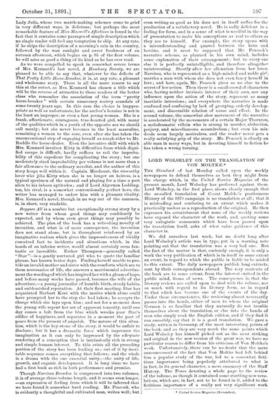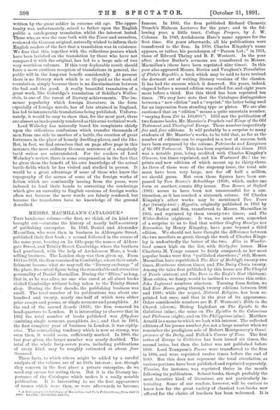LORD WOLSELEY ON THE TRANSLATION OF VON MOLTKE.*
THE Standard of last Monday called upon the weekly newspapers to defend themselves as best they might from the charge which, in the United Service Magazine of the present month, Lord Wolseley has preferred against them. Lord Wolseley, in the first place, shows clearly enough that the so-called translation of Count Moltke's posthumous History of the 1870 campaign is no translation at all ; that it is misleading and confusing to an extent which makes it practically useless as a reproduction of the original. He then expresses his astonishment that none of the weekly reviews have exposed the character of the work, and, quoting some very eulogistic comments which have been passed upon the translation itself, asks of what value guidance of this character is.
We did ourselves last week, but no doubt long after Lord Wolseley's article was in type, put in a warning note pointing out that the translation was a very bad one. But the fact of the matter is that, curiously enough, it is only a work the very publication of which is in itself to some extent an event, in regard to which the public is liable to be misled to this extent. The daily newspapers publish long extracts, sent by their correspondents abroad. The very contents of the hook are to some extent, from the interest excited in the public mind, items of news. The consequence is, that the literary reviews are called upon to deal with the volume, not so much with regard to its literary form, as in regard to that which has become one of the events of the day. Under these circumstances, the reviewing almost necessarily passes into the hands, either of men to whom the original German is so familiar that they naturally do not trouble themselves about the translation, or else into the hands of men who simply read the English edition, and if they find it run smoothly, say that it is a good translation. We gave a study, written in Germany, of the most interesting points of the book, and as they are very much the same points which Lord Wolseley has himself picked out as the most striking and original in the new version of the great war, we have no particular reason to differ from his criticism of Von Moltke's work. Unfortunately, there can be no doubt that the mere announcement of the fact that Von Moltke had left behind him a popular study of the war, led to a somewhat ficti- tious importance being popularly attributed to what is in fact, in its general character, a mere summary of the Staff History. The Times devoting a whole page to the review of the volume, as though it contained some startling new reve- lations, which are, in fact, not to be found in it, added to the fictitious importance of a really not very significant work United Service Magazine (November). written by the great soldier in extreme old age. The oppor- tunity was, unfortunately, seized to father upon the English public a catch-penny translation whilst the interest lasted. Those who, as was the case both with the Times and ourselves, reviewed the German original, naturally wished to inform their English readers of the fact that a translation was in existence. We fear that this, together with the ridiculous praises which have been lavished on the translation by those who have not compared it with the original, has led to a large sale of two very worthless volumes. If this very deplorable result should force a more cautious reception of translations in general, the public will in the long-run benefit considerably. At present there is no literary work which is so ill-paid as the work of translation, simply because there is no discrimination between the bad and the good. A really beautiful translation of a great work, like Coleridge's translation of Schiller's Wallen- stein, is one of the rarest of literary achievements. The im- mense popularity which foreign literature, in the form especially of foreign novels, has of late attained in England, has led to innumerable translations being published. Unfortu- nately, it would be easy to show that, for the most part, these are almost as inadequately rendered as this semi-technical work.
Lord Wolseley has naturally based his complaints chiefly upon the ridiculous confusions which transfer thousands of men from one side to another of a battle, the creation of great fortresses in the place of homely dwelling-places, and the like. But, in fact, we find ourselves that on page after page in this instance, the most ordinary German sentences of a singularly lucid writer are mistranslated. For the readers of Lord Wolseley's review, there is some compensation in the fact that he gives them the benefit of his own knowledge of the actual battle-fields which he has visited and studied in person. It would be a great advantage if some of those who know the topography of the scenes of some of the foreign works of fiction which are continually issuing from the press, were induced to lend their hands to correcting the renderings which give an unreality to English versions of foreign works, -often not because the mere words are falsely rendered, but because the translators have no knowledge of the ground described.



































 Previous page
Previous page